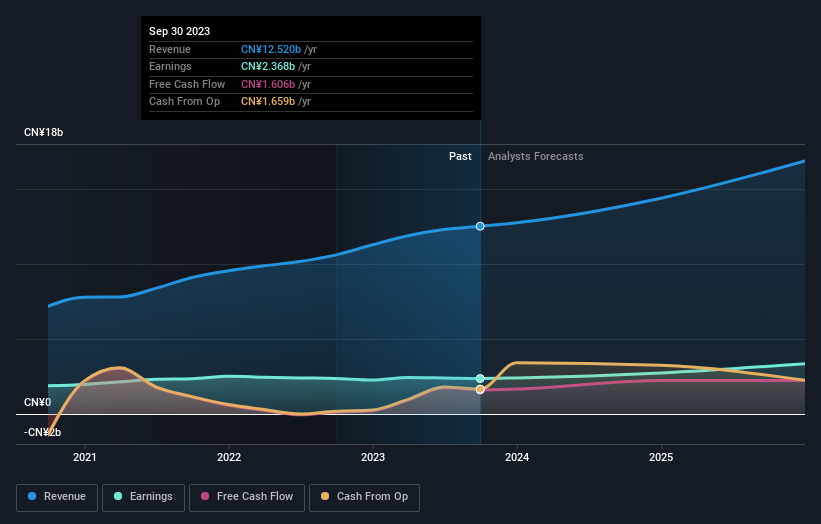Stock Analysis
- United States
- /
- Consumer Finance
- /
- NYSE:FINV
FinVolution Group's (NYSE:FINV): Top Key Executive Shaofeng Gu is the most bullish insider, and their stock value gained 3.8% last week

Key Insights
- FinVolution Group's significant insider ownership suggests inherent interests in company's expansion
- 53% of the business is held by the top 5 shareholders
- Institutions own 32% of FinVolution Group
Every investor in FinVolution Group (NYSE:FINV) should be aware of the most powerful shareholder groups. With 43% stake, individual insiders possess the maximum shares in the company. That is, the group stands to benefit the most if the stock rises (or lose the most if there is a downturn).
As a result, insiders were the biggest beneficiaries of last week’s 3.8% gain.
Let's delve deeper into each type of owner of FinVolution Group, beginning with the chart below.
View our latest analysis for FinVolution Group

What Does The Institutional Ownership Tell Us About FinVolution Group?
Many institutions measure their performance against an index that approximates the local market. So they usually pay more attention to companies that are included in major indices.
We can see that FinVolution Group does have institutional investors; and they hold a good portion of the company's stock. This implies the analysts working for those institutions have looked at the stock and they like it. But just like anyone else, they could be wrong. If multiple institutions change their view on a stock at the same time, you could see the share price drop fast. It's therefore worth looking at FinVolution Group's earnings history below. Of course, the future is what really matters.

We note that hedge funds don't have a meaningful investment in FinVolution Group. From our data, we infer that the largest shareholder is Shaofeng Gu (who also holds the title of Top Key Executive) with 30% of shares outstanding. Its usually considered a good sign when insiders own a significant number of shares in the company, and in this case, we're glad to see a company insider play the role of a key stakeholder. Meanwhile, the second and third largest shareholders, hold 6.7% and 6.3%, of the shares outstanding, respectively. Interestingly, the third-largest shareholder, Jun Zhang is also a Member of the Board of Directors, again, indicating strong insider ownership amongst the company's top shareholders. Furthermore, CEO Tiezheng Li is the owner of 2.5% of the company's shares.
To make our study more interesting, we found that the top 5 shareholders control more than half of the company which implies that this group has considerable sway over the company's decision-making.
While it makes sense to study institutional ownership data for a company, it also makes sense to study analyst sentiments to know which way the wind is blowing. There are a reasonable number of analysts covering the stock, so it might be useful to find out their aggregate view on the future.
Insider Ownership Of FinVolution Group
The definition of company insiders can be subjective and does vary between jurisdictions. Our data reflects individual insiders, capturing board members at the very least. The company management answer to the board and the latter should represent the interests of shareholders. Notably, sometimes top-level managers are on the board themselves.
I generally consider insider ownership to be a good thing. However, on some occasions it makes it more difficult for other shareholders to hold the board accountable for decisions.
Our information suggests that insiders maintain a significant holding in FinVolution Group. It has a market capitalization of just US$1.5b, and insiders have US$634m worth of shares in their own names. That's quite significant. It is good to see this level of investment. You can check here to see if those insiders have been buying recently.
General Public Ownership
The general public-- including retail investors -- own 25% stake in the company, and hence can't easily be ignored. This size of ownership, while considerable, may not be enough to change company policy if the decision is not in sync with other large shareholders.
Next Steps:
While it is well worth considering the different groups that own a company, there are other factors that are even more important. Consider for instance, the ever-present spectre of investment risk. We've identified 1 warning sign with FinVolution Group , and understanding them should be part of your investment process.
If you are like me, you may want to think about whether this company will grow or shrink. Luckily, you can check this free report showing analyst forecasts for its future.
NB: Figures in this article are calculated using data from the last twelve months, which refer to the 12-month period ending on the last date of the month the financial statement is dated. This may not be consistent with full year annual report figures.
Valuation is complex, but we're helping make it simple.
Find out whether FinVolution Group is potentially over or undervalued by checking out our comprehensive analysis, which includes fair value estimates, risks and warnings, dividends, insider transactions and financial health.
View the Free AnalysisHave feedback on this article? Concerned about the content? Get in touch with us directly. Alternatively, email editorial-team (at) simplywallst.com.
This article by Simply Wall St is general in nature. We provide commentary based on historical data and analyst forecasts only using an unbiased methodology and our articles are not intended to be financial advice. It does not constitute a recommendation to buy or sell any stock, and does not take account of your objectives, or your financial situation. We aim to bring you long-term focused analysis driven by fundamental data. Note that our analysis may not factor in the latest price-sensitive company announcements or qualitative material. Simply Wall St has no position in any stocks mentioned.
About NYSE:FINV
FinVolution Group
FinVolution Group operates in the online consumer finance industry.
Very undervalued with flawless balance sheet.

